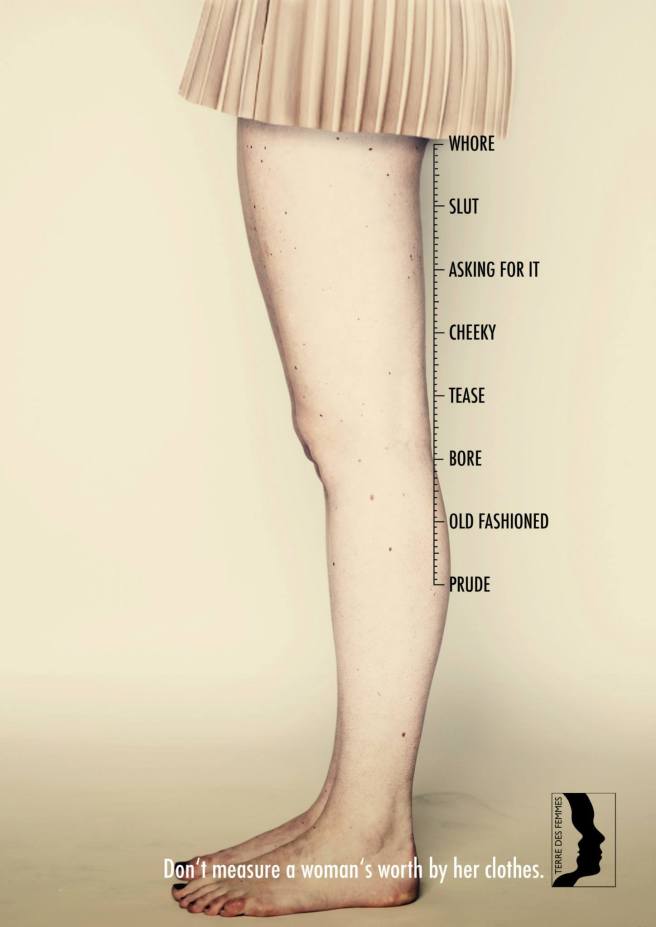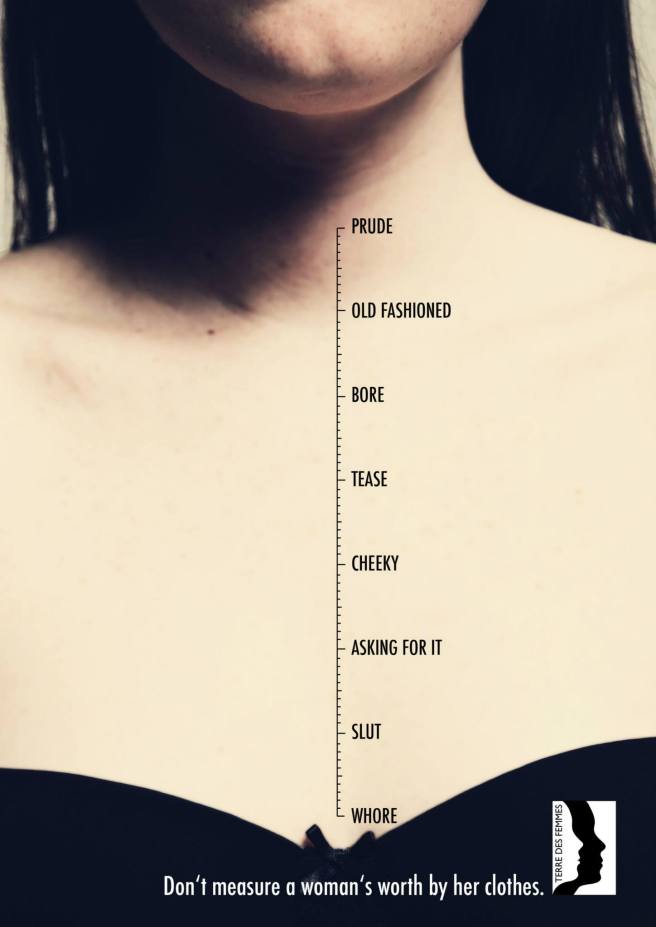Yesterday, I came across an advertisement, “Don’t measure a woman’s worth by her clothes” by TerreDesFemmes. I think these kind of ads may increase the awareness. 


Images are taken from the TerreDesFemmes Facebook account.
Yesterday, I came across an advertisement, “Don’t measure a woman’s worth by her clothes” by TerreDesFemmes. I think these kind of ads may increase the awareness. 


Images are taken from the TerreDesFemmes Facebook account.
Nobody is born one gender or the other, says the philosopher. “We act and walk and speak and talk in ways that consolidate an impression of being a man or being a woman.”
Question: What does it mean that gender is performative?
Judith Butler: It’s one thing to say that gender is performed and that is a little different from saying gender is performative. When we say gender is performed we usually mean that we’ve taken on a role or we’re acting in some way and that our acting or our role playing is crucial to the gender that we are and the gender that we present to the world. To say that gender is performative is a little different because for something to be performative means that it produces a series of effects. We act and walk and speak and talk in ways that consolidate an impression of being a man or being a woman.
I was walking down the street in Berkeley when I first arrived several years ago and a young woman who was I think in high school leaned out of her window and she yelled, “Are you a lesbian?”, and she was looking to harass me or maybe she was just freaked out or she thought I looked like I probably was one or wanted to know and I thought to myself well I could feel harassed or stigmatized, but instead I just turned around and I said yes I am and that really shocked her.
We act as if that being of a man or that being of a women is actually an internal reality or something that is simply true about us, a fact about us, but actually it’s a phenomenon that is being produced all the time and reproduced all the time, so to say gender is performative is to say that nobody really is a gender from the start. I know it’s controversial, but that’s my claim.
Question: How should this notion of gender performativity change the way we look at gender?
Judith Butler: Think about how difficult it is for sissy boys or how difficult it is for tomboys to function socially without being bullied or without being teased or without sometimes suffering threats of violence or without their parents intervening to say maybe you need a psychiatrist or why can’t you be normal. So there are institutional powers like psychiatric normalization and there are informal kinds of practices like bullying which try to keep us in our gendered place.
I think there is a real question for me about how such gender norms get established and policed and what the best way is to disrupt them and to overcome the police function. It’s my view that gender is culturally formed, but it’s also a domain of agency or freedom and that it is most important to resist the violence that is imposed by ideal gender norms, especially against those who are gender different, who are nonconforming in their gender presentation.
Thanks to http://bigthink.com .
Excellent award winning animation from the Celia Bullwinkel. Thanks for this animation to show women how to love themselves while their body is changing.
AWARDS & RECOGNITION
ASIFA-East Animation Festival (NYC, NY) WINNER, INDEPENDENT FILMS: FIRST PLACE
Lunafest 2014 Winner (toured in over 100 US cities)
Chicago International Children’s Film Festival (Chicago, IL) YOUTH JURY PRIZE, 2ND PRIZE
Black Maria Film and Video Festival (Jersey City, NJ) JURY’S CITATION AWARD, 2ND PRIZE
WAMMFest (Women and Minorities in Media Fest) (Towson, MD) WINNER FOR BEST ANIMATION
Pittsburgh Independent Film Festival (Pittsburgh, PA) WINNER FOR BEST ANIMATION
VIMEO Staff Pick
SCREENINGS
High Falls Film Festival (Rochester, NY)
Anifilm International Festival of Animated Films (Třeboň, Czech Republic)
Flying Broom Int’l Women’s Film Festival (Ankara, Turkey)
ASIFA-East Animation Festival (NYC, NY) — WINNER, INDEPENDENT FILMS: FIRST PLACE
Annecy + (Annecy, France)
Femina International Women’s Film Festival (Rio de Janeiro, Brazil)
Animation Block Party (Brooklyn, NY)
Anima Mundi (Rio de Janeiro/Sao Paulo, Brazil)
Martha’s Vineyard International Film Festival (Vineyard Haven, MA)
Naperville Independent Film Festival (Naperville, IL)
Coney Island Film Festival (Brooklyn, NY)
Woodstock Film Festival (Woodstock, NY)
Film Columbia Festival (Chatham, NY)
Aesthetica Short Film Festival (York, UK)
Cutout Fest International Film Festival (Queretaro, Mexico)
Klik Amsterdam Animation Festival (Amsterdam, Netherlands)
DC Independent FIlm Festival (Washington DC)
Florida Film Festival (Maitland, Florida)
Twillerama, at the Legion Bar (Brooklyn, NY)
Bolderlife Festival (Denver, CO)
Thanks to Pew Research Center, we can gather the recent cyber harassment statistics. This survey was conducted May 30 – June 30, 2014 and self-administered via the internet by 2,849 web users, with a margin of error of plus or minus 2.4 percentage points. Here some important statistics for the cyber harassment:
Those who witnessed harassment said they had seen at least one of the following occur to others online:
Those who have personally experienced online harassment said they were the target of at least one of the following online:
Among those who have experienced online harassment, 60% decided to ignore their most recent incident while 40% took steps to respond to it. Those who responded to their most recent incident with online harassment took the following steps:
References: http://www.pewinternet.org/2014/10/22/online-harassment/
World Wide Web Foundation’s 2014–15 Web Index shows that most of the countries fail to protect the women by law. According to the web index,
For more information please check the http://thewebindex.org/.
References : http://thewebindex.org/
Here, I will list the academic articles and links that it would be useful for the cyber violence studies. I will update this post whenever I found and I thought that it would be useful for these studies.
Battered Women’s Support Service, in short BWSS, contribute to the freedom and liberation of girls and women from violence and to empower our community through training and education program. They also deal with the cyber violence against women. Their mission according to their site is
Battered Women’s Support Services provides education, advocacy and support services to assist all battered women in its aim to work towards the elimination of violence and to work from a feminist perspective that promotes equality for all women
They prepare booklets for the cyber violence to increase the awareness, they engage a research in this issue and make surveys to deal with the cyber violence and to understand the effects of the cyber violence.
For the ones who want to give their support for the cyber violence research and want to share their thoughts and experience. please follow the link below.
http://www.bwss.org/cyber-bullying-as-gender-based-violence/
According to the Pew Internet Project’s research on the social networking
As of January 2014, 74% of online adults use social networking sites

As of January 2014, 19% of online adults use Twitter.

Although percentage of the women Twitter user is less than the men, women tweets more. Here is the proof

If you want more stats, according to the beevolve.com. According to this site, 53% women user in the Twitter.

Although women tweets more, they prefer protected accounts. My comment on this issue is women prefer protected account because they want to prevent or minimize the cyber violence, stalking, haressement, etc. Yes, cyber-violence force women to limit themselves.

Finally, I want to show you the gender distribution by country on the Twitter .

Thanks for the beevolve.com and Pew Internet Research for their statistical analysis.
If you are curious about other statistics, please check this links, Pew Internet Research and beevolve.com
References
[1] http://www.pewinternet.org/fact-sheets/social-networking-fact-sheet/
Internet Governance Forum or in short IGF is a multi-stakeholder forum to discuss the internet policies and internet governance. IGF 2014 takes place at Istanbul and this year, “Feminist Principles of the Internet” at the Sexual Rights are discussed as a pre-event of this forum. So various sexual rights activists, women’s human rights defenders and gender equality advocates share their precious thoughts on the intersections between sexuality and internet rights in the framework or internet governance. As we know, cyberspace becomes more sexist and day by day the number of women who faced with any kind of cyber violence increases. In order to prevent this, in this pre-event, the following themes are discussed.
– Pornography, children and violence;
– Access, transformation and resistance;
– Privacy, anonymity and data;
– Amplify, Information and regulation
Thanks to this pre-event and sexual rights activists, women’s human rights defenders and gender equality advocates may be some problems related to cyber violence will be solved in the future.
For more information about this pre-event, please check this links( (Re)govern and (Re)imagine a feminist internet: Sex, rights and internet governance at the IGF 2014)
After various reading and watching news about the gender based violence in internet, I conclude that(also various researchers think like that) internet policies and law to protect the women is not sufficient. So, knowing the internet policies and keep abreast of the changes, if any, becomes important. But how do we know the policies and changes.Hmm, at this point, I want you to introduce a perfect site for internet policies in terms of feminist perspective. This site is GenderIT(http://www.genderit.org/ ). It site is emerged from the Association for Progressive Communications Women’s Rights Programme’s advocacy work in information and communications technologies (ICTs). National policy, gender-sensitive language, understanding of the impact of poor or positive policy, etc. is their concern. This site monitor ICT policies which affect women around the world, but specifically in four regions – Africa, Asia-Pacific, Central Eastern Europe and Latin America.
They give news about the internet governance, various feminist talks for this issue, etc. This site is perfect for the women to understand the laws and policies.